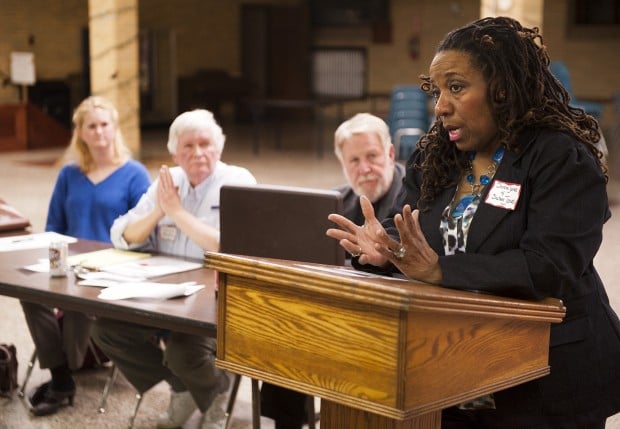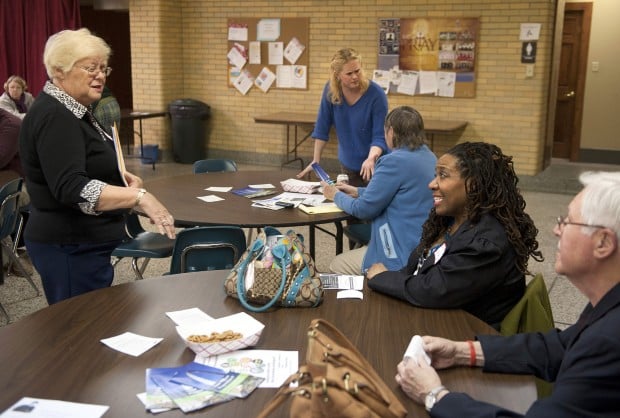ST. LOUIS ŌĆó Andrew Wimmer, a candidate for the cityŌĆÖs elected School Board, cut to the chase.
ŌĆ£A lot of people have asked the question, why run for the School Board when the Special Administrative Board is in control of the district?ŌĆØ he said at the Ward 8 meeting last week in the cityŌĆÖs Shaw neighborhood.
ItŌĆÖs the same question posed to the four other candidates from time to time as they run for three open seats on the school districtŌĆÖs Board of Education ŌĆö a group that lost power in 2007 after the state stripped ║³└Ļ╩ėŲĄ Public Schools of accreditation.
ŌĆ£My answer is the Board of Education ŌĆö the elected board ŌĆö is in a position to reconnect with parents and families,ŌĆØ Wimmer, 57, told the 20 voters gathered in a church basement. ŌĆ£The detrimental effect of having the SAB in control for this long is, little by little, people have disconnected from the schools.ŌĆØ
People are also reading…
On April 2, city voters will elect three members to a board charged with monitoring ŌĆö not governing ŌĆö the school district. The Special Administrative Board, made up of Chairman Rick Sullivan, Melanie Adams and Richard Gaines, controls the districtŌĆÖs purse strings and sets its policy.
Even so, the seven-member elected board continues to meet most months inside the dance studio at Carr Lane VPA Middle School. And every two to three years, seats are up for election. This time, incumbents Chad Beffa, Emile Bradford-Taylor and Rebecca Rogers are stepping down. Susan Jones, Bill Monroe, Anthony Schilli, Kathy Styer and Wimmer are running for their spots in citywide races. The terms are four years.
Potentially, the three new members could serve during the boardŌĆÖs transition back to power. That is, if the Missouri Board of Education allows it.
ŌĆ£The feeling is, the Special Administrative Board is due to go out of existence at some time,ŌĆØ said Mary Beth Purdy, campaigning for her grandson Tony Schilli at the ward meeting last week.
An advisory panel led by former Washington University Chancellor William Danforth and civil rights leader Frankie Freeman recommended the elected board return only after the district is back on track and receives provisional or full accreditation. That was in 2010. The district received provisional accreditation last September.
But Missouri Education Commissioner Chris Nicastro has shown no indication that she favors returning the districtŌĆÖs control to the elected board anytime soon. The special board is set to expire in June 2014. The Missouri Department of Elementary and Secondary Education will consider this fall whether to recommend another extension to keep the special board in place, Nicastro said by email.
ŌĆ£The local elected board is what got the school district in trouble in the first place,ŌĆØ State Board President Peter Herschend of Branson said in September.
The elected boardŌĆÖs lack of power angers candidate Monroe, a former police officer and charter school executive who blasts the appointed board whenever he tells folks heŌĆÖs running. Earlier this month, he told the SAB members they should involve the elected board at their meetings.
And the reality bothers candidate Styer, an accountant whose two daughters graduated from city schools. She told the small audience at the Ward 8 meeting she wants to ease the transition, and accelerate it, back to the elected board.
Jones, 26, who lobbied against the takeover as a high school student, told local radio host Lizz Brown last week that having an appointed board is equivalent to taxation without representation.
ŌĆ£When they took over the schools, they took away the voices for not only the students, but the community,ŌĆØ said Jones, who works in the Ritenour School District. ŌĆ£The SAB, their time has come to an end.ŌĆØ
JonesŌĆÖ mother, Donna Jones, is a current board member.
About a decade ago, the elected School Board became known for theatrics.
One board member put a curse on the mayor in 2003, and the following year she was arrested for dumping a pitcher of ice water on a high-ranking school administrator. Meetings routinely erupted into yelling matches. Superintendents complained of micromanagement. By 2006, the district had gone through six superintendents in three years.
Over the years, elected board members have met with Nicastro about their concerns and the future governance of ║³└Ļ╩ėŲĄ Public Schools. They drafted a transition plan in 2010. They attended a governing workshop put on by the Missouri School BoardsŌĆÖ Association.
But the board remains in limbo.
ŌĆ£ItŌĆÖs been quite frustrating,ŌĆØ said David Jackson, vice president of the elected board. ŌĆ£Every time you think youŌĆÖre moving forward, you take a step back, or come to a complete standstill.ŌĆØ
Missouri education officials credit the districtŌĆÖs gains in recent years to Superintendent Kelvin Adams, hired in 2008 by the Special Administrative Board. Members of the special board were appointed by the governor, the mayor and the aldermanic president.
Whenever asked whether that boardŌĆÖs term should be extended, Sullivan, its chief executive, declines to comment, saying itŌĆÖs not his decision.
But candidates openly speak against it.
ŌĆ£The longer the tenure of the appointed board, the more disconnected and disenfranchised people become,ŌĆØ said Wimmer, an instructor at ║³└Ļ╩ėŲĄ Community College at Forest Park who has one son in city schools and another son who is a graduate.
A bill filed by state Sen. Jamilah Nasheed, D-║³└Ļ╩ėŲĄ,would return the district to an elected board as early as July. The bill, however, hasnŌĆÖt made it out of committee.
Almost monthly, the seven elected School Board members walk into the mirrored dance studio at Carr Lane, where they gather for discussions related to the district. They sit at a table with name placards. Yet there are no microphones, no secretary and hardly an audience. Members pass resolutions that carry no weight. Meetings can last for hours.
For a few years, a videographer from the school district would come and tape the meetings. No longer.
ŌĆ£A lot of people donŌĆÖt know we exist,ŌĆØ Jackson said.















